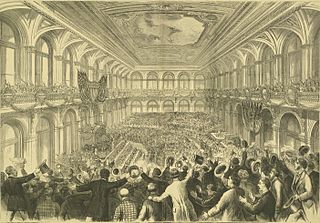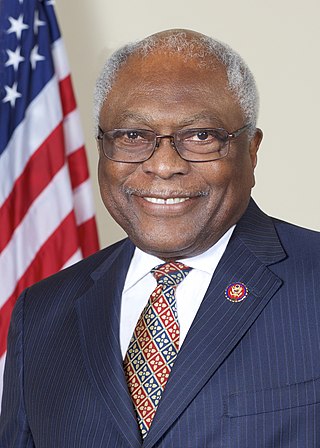Related Research Articles

The 1912 United States presidential election was the 32nd quadrennial presidential election, held on Tuesday, November 5, 1912. Democratic Governor Woodrow Wilson of New Jersey unseated incumbent Republican President William Howard Taft while defeating former President Theodore Roosevelt and Socialist Party nominee Eugene V. Debs.

The 1948 United States presidential election was the 41st quadrennial presidential election. It was held on Tuesday, November 2, 1948. In one of the greatest election upsets in American history, incumbent Democratic President Harry S. Truman defeated heavily favored Republican New York Governor Thomas E. Dewey, and third-party candidates, becoming the third president to succeed to the presidency upon his predecessor's death and be elected to a full term.

The States' Rights Democratic Party, also colloquially referred to as the Dixiecrat Party was a short-lived segregationist political party in the United States, active primarily in the South. It arose due to a Southern regional split in opposition to the national Democratic Party. After President Harry S. Truman, the leader of the Democratic Party, ordered integration of the military in 1948 and other actions to address civil rights of African Americans, including the first presidential proposal for comprehensive civil and voting rights, many Southern white politicians who objected to this course organized themselves as a breakaway faction. They wished to protect the ability of states to maintain racial segregation. Its members were referred to as "Dixiecrats", a portmanteau of "Dixie", referring to the Southern United States, and "Democrat".

Each of the 50 U.S. states, the District of Columbia, and territories of the United States holds either primary elections or caucuses to help nominate individual candidates for president of the United States. This process is designed to choose the candidates that will represent their political parties in the general election.
In American politics, a superdelegate is a delegate to a presidential nominating convention who is seated automatically.

A United States presidential nominating convention is a political convention held every four years in the United States by most of the political parties who will be fielding nominees in the upcoming U.S. presidential election. The formal purpose of such a convention is to select the party's nominee for popular election as President, as well as to adopt a statement of party principles and goals known as the party platform and adopt the rules for the party's activities, including the presidential nominating process for the next election cycle.
Smith v. Allwright, 321 U.S. 649 (1944), was a landmark decision of the United States Supreme Court with regard to voting rights and, by extension, racial desegregation. It overturned the Texas state law that authorized parties to set their internal rules, including the use of white primaries. The court ruled that it was unconstitutional for the state to delegate its authority over elections to parties in order to allow discrimination to be practiced. This ruling affected all other states where the party used the white primary rule.

James Enos Clyburn is an American politician serving as the U.S. representative for South Carolina's 6th congressional district. First elected in 1992, Clyburn's congressional district includes most of the majority-black precincts in and around Columbia and Charleston, as well as most of the majority-black areas outside Beaufort and nearly all of South Carolina's share of the Black Belt. Since Joe Cunningham's departure in 2021, Clyburn has been the only Democrat in South Carolina's congressional delegation.

The 1912 Republican National Convention was held at the Chicago Coliseum, Chicago, Illinois, from June 18 to June 22, 1912. The party nominated President William Howard Taft and Vice President James S. Sherman for re-election for the 1912 United States presidential election.
The Utah Democratic Party is the affiliate of the Democratic Party in the U.S. state of Utah. The party describes itself as a big tent party.
White primaries were primary elections held in the Southern United States in which only white voters were permitted to participate. Statewide white primaries were established by the state Democratic Party units or by state legislatures in South Carolina (1896), Florida (1902), Mississippi and Alabama, Texas (1905), Louisiana and Arkansas (1906), and Georgia (1900). Since winning the Democratic primary in the South at the time almost always meant winning the general election, barring black and other minority voters meant they were in essence disenfranchised. Southern states also passed laws and constitutions with provisions to raise barriers to voter registration, completing disenfranchisement from 1890 to 1908 in all states of the former Confederacy.

The 1944 South Carolina United States Senate election was held on November 7, 1944 to select the U.S. Senator from the state of South Carolina.

The 1938 South Carolina United States Senate election was held on November 8, 1938, to select the U.S. Senator from the state of South Carolina. Incumbent Democratic Senator Ellison D. Smith defeated Governor Olin D. Johnston in the Democratic primary. The general election was contested, but a victory by Smith was never in doubt.

Presidential primaries and caucuses were organized by the Democratic Party to select the 4,051 delegates to the 2016 Democratic National Convention held July 25–28 and determine the nominee for President in the 2016 United States presidential election. The elections took place within all fifty U.S. states, the District of Columbia, five U.S. territories, and Democrats Abroad and occurred between February 1 and June 14, 2016. Between 2008 and 2024, this was the only Democratic Party primary in which the nominee had never been nor had ever become President of the United States. This was the first Democratic primary to nominate a woman for President.

The 2016 United States presidential election was held on November 8, 2016, as part of the 2016 General Election in which all 50 states plus the District of Columbia participated. South Carolina voters chose electors to represent them in the Electoral College via a popular vote pitting the Republican Party's nominee, businessman Donald Trump, and running mate Indiana Governor Mike Pence against Democratic Party nominee, former Secretary of State Hillary Clinton and her running mate, Virginia Senator Tim Kaine.

The 2016 United States presidential election in Virginia was held on November 8, 2016, as part of the 2016 general election in which all 50 states plus the District of Columbia participated. Virginia voters chose electors to represent them in the Electoral College via a popular vote pitting the Republican Party's nominee, businessman Donald Trump, and running mate Indiana Governor Mike Pence against Democratic Party nominee, former Secretary of State Hillary Clinton and her running mate, Virginia Senator Tim Kaine.

From March 7 to June 6, through a series of primaries and caucuses, voters of the Republican Party elected delegates to the 1916 Republican National Convention, held June 7 to June 10, 1916, in Chicago, Illinois to choose the party's nominee for President of the United States. The delegate election process was inconclusive, with a majority of delegates not pledged to any candidate and a small plurality supporting Associate Justice of the Supreme Court Charles Evans Hughes. Hughes eventually secured the nomination at the convention on the third ballot.
Osceola Enoch McKaine was an American public speaker, businessman, civil rights activist and political candidate. He was a candidate for US Senate in 1944 as part of a Black-led splinter challenge to the Democratic Party.
The Lighthouse and Informer, originally the Charleston Lighthouse, was an African American newspaper in South Carolina. It was founded by journalist John Henry McCray in 1939, and it merged with the Sumter Informer in 1941, when it moved from Charleston to Columbia. It supported racial equality, denounced separate but equal educational facilities and unequal teacher pay, sought to increase black civic engagement, and endorsed non-segregationist candidates for political office. Though it was a powerful newspaper, it suffered financial difficulties due to the conviction of McCray on libel and parole-related charges, and it declared bankruptcy and dissolved in 1954.
References
- Lau, Peter F. (2006). Democracy Rising: South Carolina and the Fight for Black Equality Since 1865. University Press of Kentucky. pp. 136–144. ISBN 0-8131-2393-3.